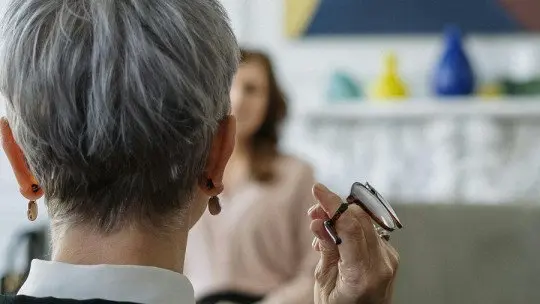In the complex world of psychotherapy, where words are the primary vehicle for healing and personal growth, active listening emerges as a crucial and transformative skill. Beyond simply hearing, active listening involves full, conscious attention to every nuance of the patient’s communication, both verbal and nonverbal. This seemingly simple but profoundly powerful technique has become a fundamental pillar of effective therapeutic practice.
The importance of active listening in the psychotherapeutic context cannot be underestimated. It acts as a bridge connecting the patient’s internal experiences with the therapist’s empathic understanding, creating a safe space for exploration and change. As we delve deeper into this topic, we will discover how active listening not only benefits the patient in their journey of self-discovery, but also enriches the therapist’s practice.
What is active listening in psychotherapy?
Active listening in psychotherapy is a fundamental skill that goes beyond simply hearing the patient’s words. It is a dynamic and conscious process in which the therapist fully engages in communication, paying attention not only to the verbal content, but also to emotional nuances, body language, and what is not explicitly said. This approach involves a number of key elements:
Active listening is, in essence, a powerful tool that allows the therapist to build a deep and accurate understanding of the patient’s internal world, thus facilitating a more effective and meaningful therapeutic process.
Patient benefits of active listening
The active listening of the psychotherapist provides numerous benefits to the patient, contributing significantly to their healing process and personal growth. In this section, we will discuss the main benefits that patients experience thanks to active listening.
1. Trust and openness
First, it fosters trust and openness. By feeling genuinely heard and understood, the patient develops a bond of trust with the therapist. allowing you to open up more easily and share deep thoughts and emotions that you may have never expressed before.
2. Emotional expression
In addition, it facilitates emotional expression. The therapist’s mindfulness creates a safe space where the patient can explore and express her emotions without fear of judgment, which is essential for emotional processing and resolution of internal conflicts.
3. Self-understanding
Active listening also promotes the patient’s self-understanding. By listening to his own words reflected by the therapist and answering open-ended questions, the patient gains new perspectives on his experiences and behaviors, fostering self-knowledge and introspection.
4. Validation
Likewise, it validates the patient’s experiences. Feeling truly heard and understood can be deeply therapeutic especially for those who have experienced invalidation in the past.
5. Empowerment
Lastly, it empowers the patient in their change process. Active listening encourages autonomy by allowing the patient to come to their own conclusions and solutions, rather than simply receiving directive advice from the therapist.
Benefits of active listening for the therapist
Active listening is a fundamental pillar in psychotherapy, benefiting both the patient and the therapist. For the patient, it provides a safe space for expression, fosters confidence and promotes self-knowledge. For the therapist, it facilitates a deeper understanding, strengthens the therapeutic relationship and improves treatment effectiveness.
This skill, which goes beyond simply hearing, involves mindfulness, empathy, and a nonjudgmental attitude. Its constant practice not only enriches the therapeutic process, but also contributes to the personal and professional growth of the therapist. In an increasingly noisy and distracted world, active listening in psychotherapy stands as a deeply healing act of presence and human connection.
Definitely, Active listening not only benefits the patient, but also offers significant advantages for the psychotherapist in their professional practice. Next, we will elaborate on some of the advantages that putting active listening skills into practice has for the therapist.
1. Better understanding
Primarily, it allows for a better understanding of the patient. By listening carefully, the therapist picks up nuances, patterns, and connections that might go unnoticed with superficial listening. This facilitates a more accurate diagnosis and a more effective treatment plan.
2. Therapeutic relationship
Active listening is essential in building a solid therapeutic relationship. To the demonstrate genuine interest and deep understanding the therapist establishes a bond of trust that is essential for the success of the therapeutic process.
3. Valuable information
In addition, it provides valuable information for treatment. The details, anecdotes, and emotions expressed by the patient during active listening offer crucial clues about their thought patterns, behaviors, and interpersonal relationships.
4. Therapeutic skills
Constant practice of active listening also improves the therapist’s overall skills. It increases your ability to concentrate, empathize and analyze, thus benefiting all your patients.
5. Avoid misunderstandings
Lastly, active listening helps the therapist avoid misunderstandings and mistaken assumptions. By constantly checking their understanding, the therapist reduces the risk of incorrect interpretations that could hinder therapeutic progress.
Do you want to learn the skills of a psychotherapist?
If you are interested in learning all the soft skills of a psychotherapist, as well as the theory necessary to care for patients, the Master in Integrative Psychotherapy from the Mensalus Institute is for you. In it, you will learn under the supervision of professionals who practice in one of the leading mental health centers in Barcelona, and you will be able to work with real patient cases.









